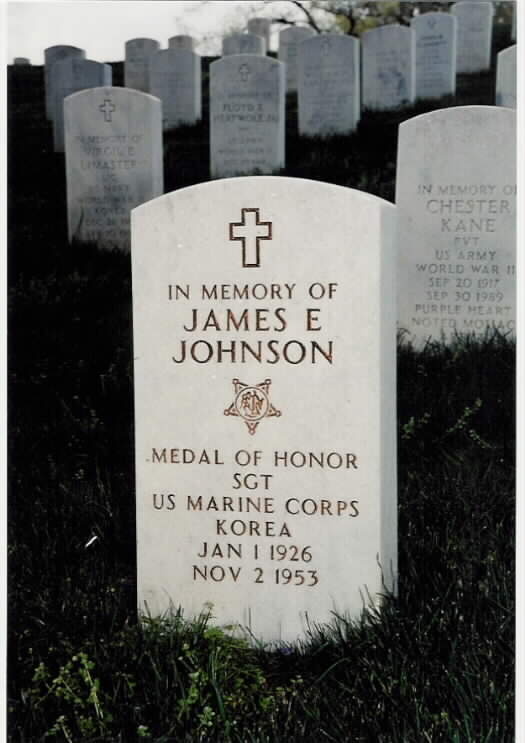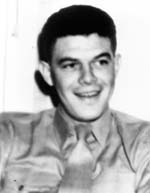James Edmund Johnson - Sergeant, United States Marine Corps (original) (raw)
Courtesy of Gayle Alvarez and the United States Marine Corps:
“Sergeant Johnson was born at Pocatello, Idaho, on January 1, 1926. He attended public schools there and played junior varsity basketball for two years in high school before enlisting in the Marine Corps on November 10, 1943. After serving in the Pacific theater and at San Diego he was discharged on February 7, 1946, and returned to Pocatello, where he worked as a machinist in the Naval Ordnance plant. He also attended Western Washington College at Bellingham, Washington, before re-enlisting in the Marines on January 13, 1948.”
Sergeant Johnson was a veteran of the Peleliu and Okinawa campaigns in World War II. “Although Sergeant Johnson was serving with a provisional company of the 7th Marine Regiment when he won the Medal of Honor, his regular outfit was the 11th Marines, the same regiment his father had served in during World War I.”
“The sergeant met his wife while he was stationed at Quantico, Virginia. They were married on October 15, 1949.” “He departed for Korea in August, 1950, just five days after the birth of his daughter, Stephanie.” Prior to leaving for Korea, he had served for “a year as an instructor in post exchange accounting at the Marine Corps Institute, Marine Barracks, 8th and I Sts., S.E., Washington.”
“When last seen by his comrades he was wounded, but still engaging the enemy in close grenade hand-to-hand combat. The enemy were wearing the uniforms of friendly troops at the time. He was listed as missing in action until January, 1954, when his death was presumed.”
His Medal of Honor was “presented to his widow, Mrs. Mary Jeanne Johnson of Washington on March 29, 1954, by Secretary of the Navy Robert B. Anderson” in the same Pentagon ceremony as two others.
“In addition to the Medal of Honor, Sergeant Johnson’s other awards include the Presidential Unit Citation with one Bronze Star for Korean service, 1950,1st Marine Division, The Navy Unit Commendation, 1944, 8th 155-mm. Gun Bn., Peleliu, The Asiatic-Pacific Campaign Medal with two Bronze Stars, 1944-1945, Asiatic-Pacific Area Western Carolines Okinawa Gunto Oper. Victory Medal, 1943-1946, World War II, Navy Occupation Service Medal with Asia Clasp, 1945, Okinawa, Korean Service Medal with three Bronze Stars, 1950-1951, North Korean Aggression, Communist China Aggression, Inchon Landing, The United Nations Service Medal, 1950-1951, Korea.”
Sergeant Johnson’s Medal of Honor “was the seventh Marine and the thirty-seventh member of the United States Armed Forces to receive the Nation’s highest award for extraordinary valor in Korea.”
“In addition to his wife and daughter, Sergeant Johnson was survived by his mother, Mrs. Juanita Hart, of San Diego, California, and a sister, Mrs. Edwin L. Hanke, of Pocatello Idaho.”
Sergeant Johnson’s name is engraved on the National Memorial of the Pacific (Wall of the Missing)-Honolulu, Hawaii and there is a Memorial Marker in his honor at Arlington National Cemetery (‘In Memory’ marker) Memorial section H, Grave 451.

James E. Johnson
Rank and organization: Sergeant, U.S. Marine Corps.
Company J, 3d Battalion, 7th Marines, 1st Marine Division (Reinforced).
Place and date: Yudam-ni, Korea, 2 December 1950 (declared missing in action on 2 December 1950, and killed in action as of 2 November 1953).
Entered service at: Washington, D.C. Born: 1 January 1926, Pocatello, Idaho.

Medal of Honor Citation
For conspicuous gallantry and intrepidity at the risk of his life above and beyond the call of duty while serving as a squad leader in a provisional rifle platoon composed of artillerymen and attached to Company J, in action against enemy aggressor forces. Vastly outnumbered by a well-entrenched and cleverly concealed enemy force wearing the uniforms of friendly troops and attacking his platoon’s open and unconcealed positions, Sgt. Johnson unhesitatingly took charge of his platoon in the absence of the leader and, exhibiting great personal valor in the face of a heavy barrage of hostile fire, coolly proceeded to move about among his men, shouting words of encouragement and inspiration and skillfully directing their fire. Ordered to displace his platoon during the fire fight, he immediately placed himself in an extremely hazardous position from which he could provide covering fire for his men. Fully aware that his voluntary action meant either certain death or capture to himself, he courageously continued to provide effective cover for his men and was last observed in a wounded condition single-handedly engaging enemy troops in close hand grenade and hand-to-hand fighting. By his valiant and inspiring leadership, Sgt. Johnson was directly responsible for the successful completion of the platoon’s displacement and the saving of many lives. His dauntless fighting spirit and unfaltering devotion to duty in the face of terrific odds reflect the highest credit upon himself and the U.S. Naval Service.
Sergeant Johnson’s body was not recovered. However, there is a Memorial headstone (In Memory Of) placed in his honor in Arlington National Cemetery.
James Edmund Johnson
Pocatello, Idaho
Born January 1, 1926
Sergeant, U.S. Marine Corps
Missing in Action – Presumed Dead
Died December 2, 1950 in Korea
Sergeant Johnson was a member of Company J, 3rd Battalion, 7th Marines, 1st Marine Division. On December 2, 1950 near Yudam-ni, North Korea, in the absence of his platoon leader, he assumed command of his platoon which was under intense enemy fire and directed its return fire. When ordered to withdraw, he positioned himself in an exposed position, to cover the withdrawal of his platoon and engaged in hand to hand combat with the enemy. He was listed as Missing in Action while fighting the enemy in Korea on December 2, 1950 and was presumed dead on November 2, 1953. For his leadership and great valor, Sergeant Johnson was awarded the Medal of Honor and the Purple Heart.

Michael Robert Patterson was born in Arlington and is the son of a former officer of the US Army. So it was no wonder that sooner or later his interests drew him to American history and especially to American military history. Many of his articles can be found on renowned portals like the New York Times, Washingtonpost or Wikipedia.